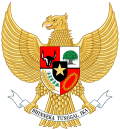House of Representatives Dewan Perwakilan Rakyat | |
|---|---|
 | |
| Type | |
| Type | |
| History | |
| Established | 15 February 1950 |
| Disbanded | 16 August 1950 |
| Preceded by | Central Indonesian National Committee |
| Succeeded by | Provisional House of Representatives |
| Leadership | |
Deputy Speaker | |
| Structure | |
| Seats | 150 members (1950) |
| Authority | Passing laws and budgets (together with the President); oversight on executive branch |
| Meeting place | |
 | |
| Sociëteit Concordia Building Jakarta, Indonesia | |
| Constitution | |
| Federal Constitution of 1949 | |
The House of Representatives of the United States of Indonesia (Indonesian : Dewan Perwakilan Rakyat Republik Indonesia Serikat, DPR-RIS) was one of the two national legislative assemblies in the United States of Indonesia (RUSI). The council was formed after the establishment of the Indonesian federal state, consisting of 150 members.
Contents
- History
- Speaker and Deputy Speaker
- Membership
- Requirements
- Composition
- Work accomplished
- Bibliography
- References
The council exercised legislative power with the government and the Senate of the Republic of Indonesia as long as the law material concerned one or all states or regions, or related to the relationship of the RUSI with that state or region. The drafting of laws concerning all powers outside of this was carried out by the President together with the DPR. [1]


